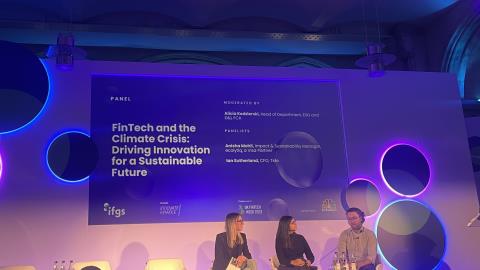During a fireside chat entitled “Fintech and the Climate Crisis: Driving Innovation for a Sustainable Future” at IFGS 2023, Anisha Mohil, the impact and sustainability manager at Ecolytiq, and Ian Sutherland, CFO of Tide, engaged in a vital conversation about the shift towards a low-carbon economy.
Mohil articulated the mission of Ecolytiq, which focuses on addressing consumer behavior regarding sustainability. The platform empowers consumers to understand how their purchasing decisions impact carbon emissions and provides actionable insights to help them reduce their carbon footprints in everyday financial choices. She highlighted the prevalent “intention-action gap,” wherein consumers often lack the necessary education and understanding of carbon emissions. By partnering with banks and financial institutions, Ecolytiq enables users to monitor their carbon impact and access more sustainable product options.
Sutherland introduced Tide as a fintech committed to assisting small and medium-sized enterprises (SMEs) in their sustainability journeys and achieving their Net Zero targets. He explained that Tide develops tools designed to help small businesses seamlessly assess and act on sustainability using comprehensive data from their app. For instance, a significant feature includes providing insights into businesses’ carbon footprints and facilitating access to carbon offset solutions aimed at reducing overall emissions.
Tide recently became the first fintech to eliminate 100% of its global carbon emissions this year. Sutherland expressed his determination to continue this progress by empowering small businesses to mitigate their emissions through sustainable carbon offsets and renewable energy solutions. He emphasized Tide’s commitment to achieving complete Net Zero status by 2030.
Sutherland also highlighted the potential of the carbon removal marketplace, noting the need for education around its feasibility. “Investing in sustainable practices is crucial,” he stated. “As more resources are directed towards these initiatives, the scalability of these technologies will improve, helping us to tackle significant aspects of the climate crisis through targeted investments.”
Mohil presented a tripartite framework for assessing impact in the sustainability sector. She urged organizations to focus on operational practices to reduce internal emissions and promote diversity and inclusion, while also leveraging NGO tools to quantitatively evaluate their impact, ensuring that their efforts are genuine and not merely greenwashing. Additionally, she stressed the importance of advocating for systemic change by engaging with policymakers and industry stakeholders.
In her advice to fintech companies, Mohil recommended a thorough assessment of materiality issues, emphasizing double materiality: the intersection of financial implications for communities and environmental impacts. She encouraged utilizing resources like the Accounting Standards Board’s materiality finder tool to assess a company’s environmental impact, which can lead to more in-depth stakeholder engagement and ultimately foster a more sustainable business landscape.
Sutherland echoed the call for companies to minimize travel to reduce carbon emissions and to leverage emerging tools that facilitate ongoing assessments of sustainability across all operational dimensions.
